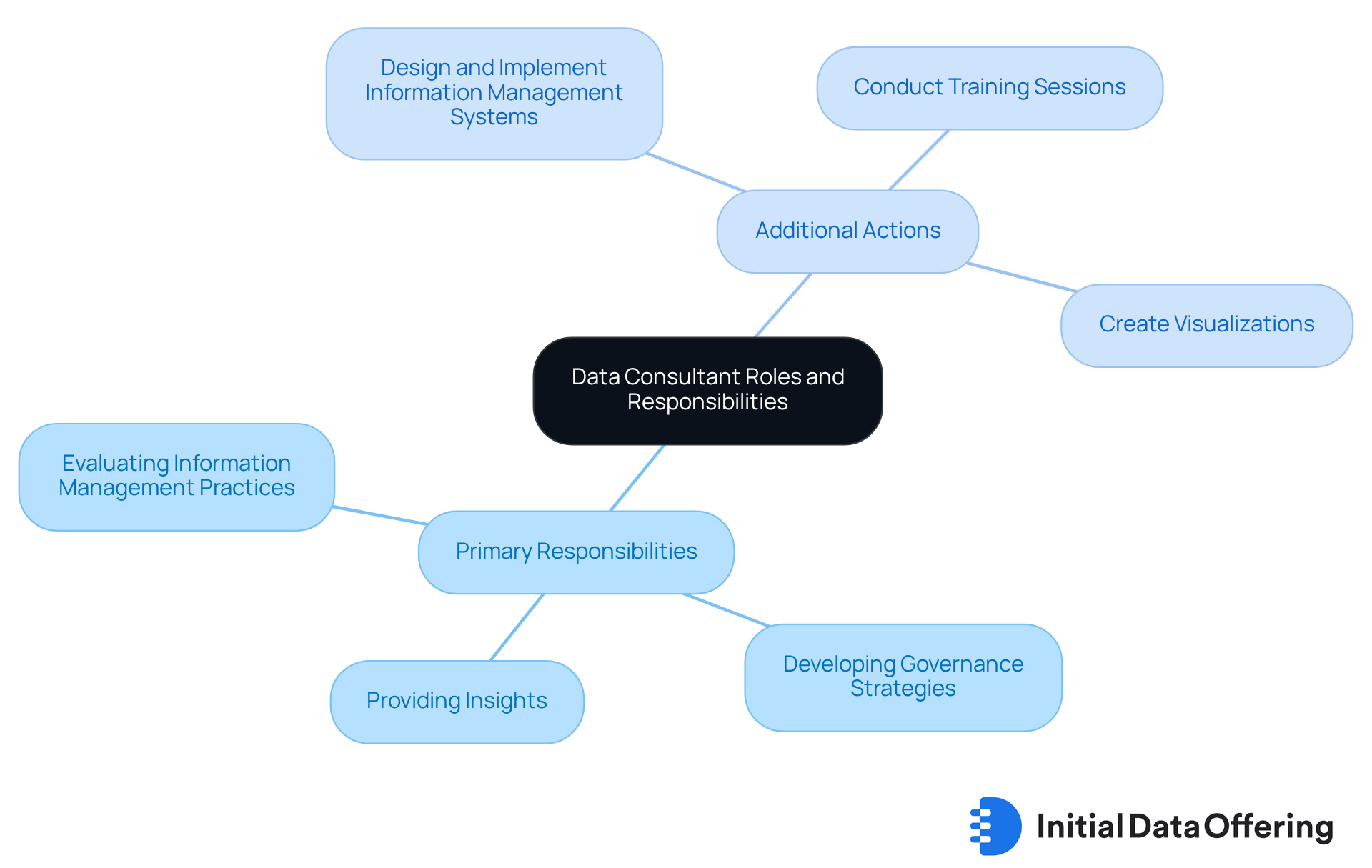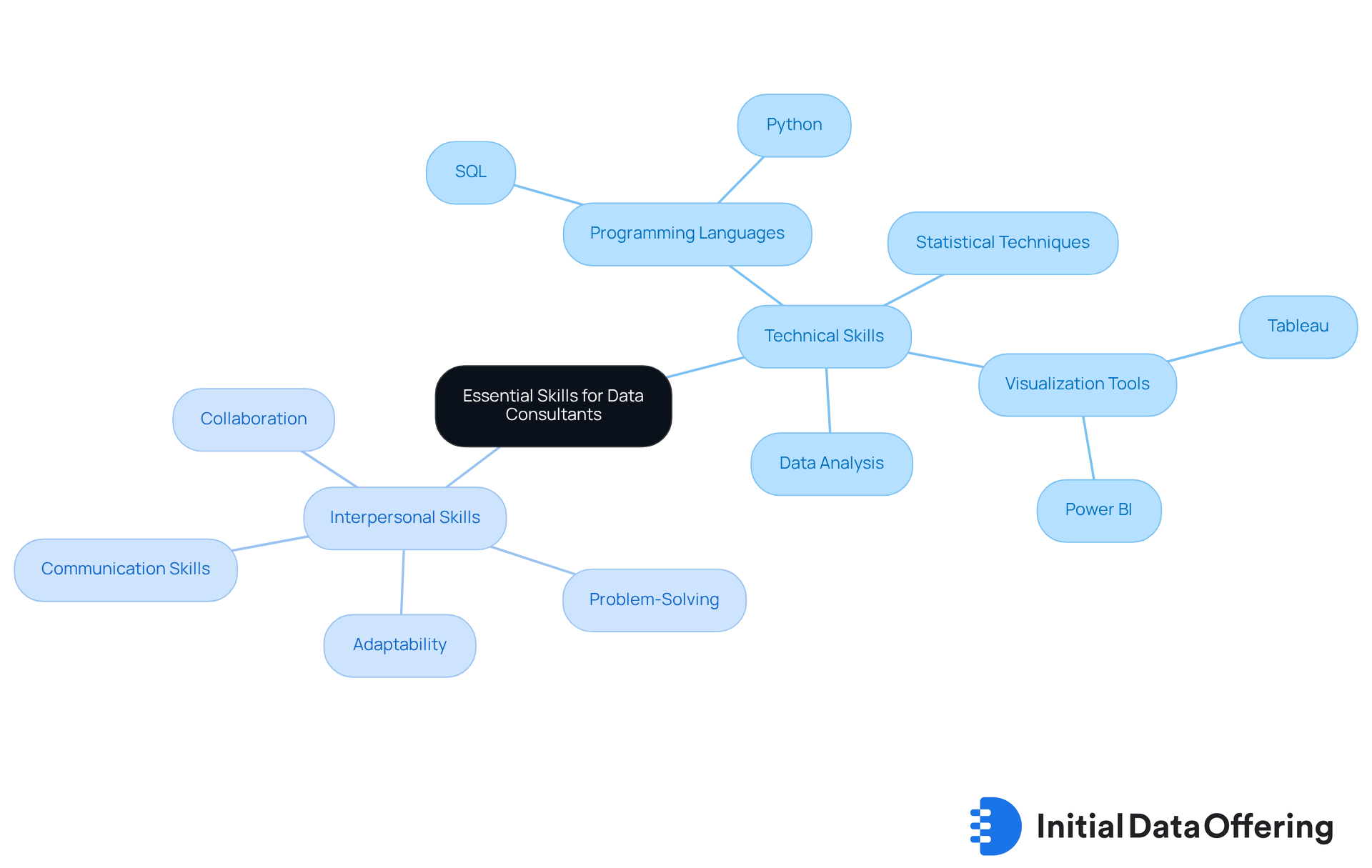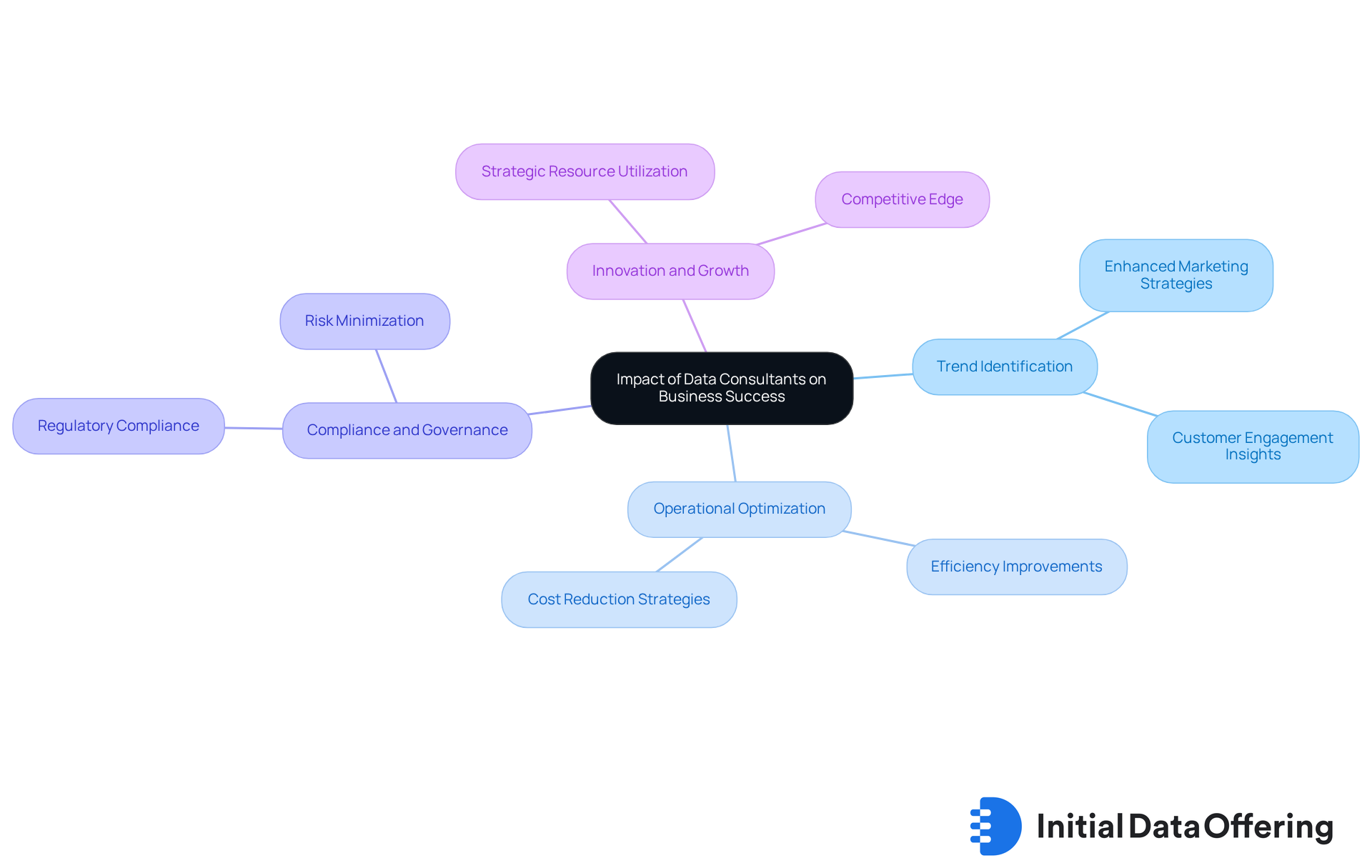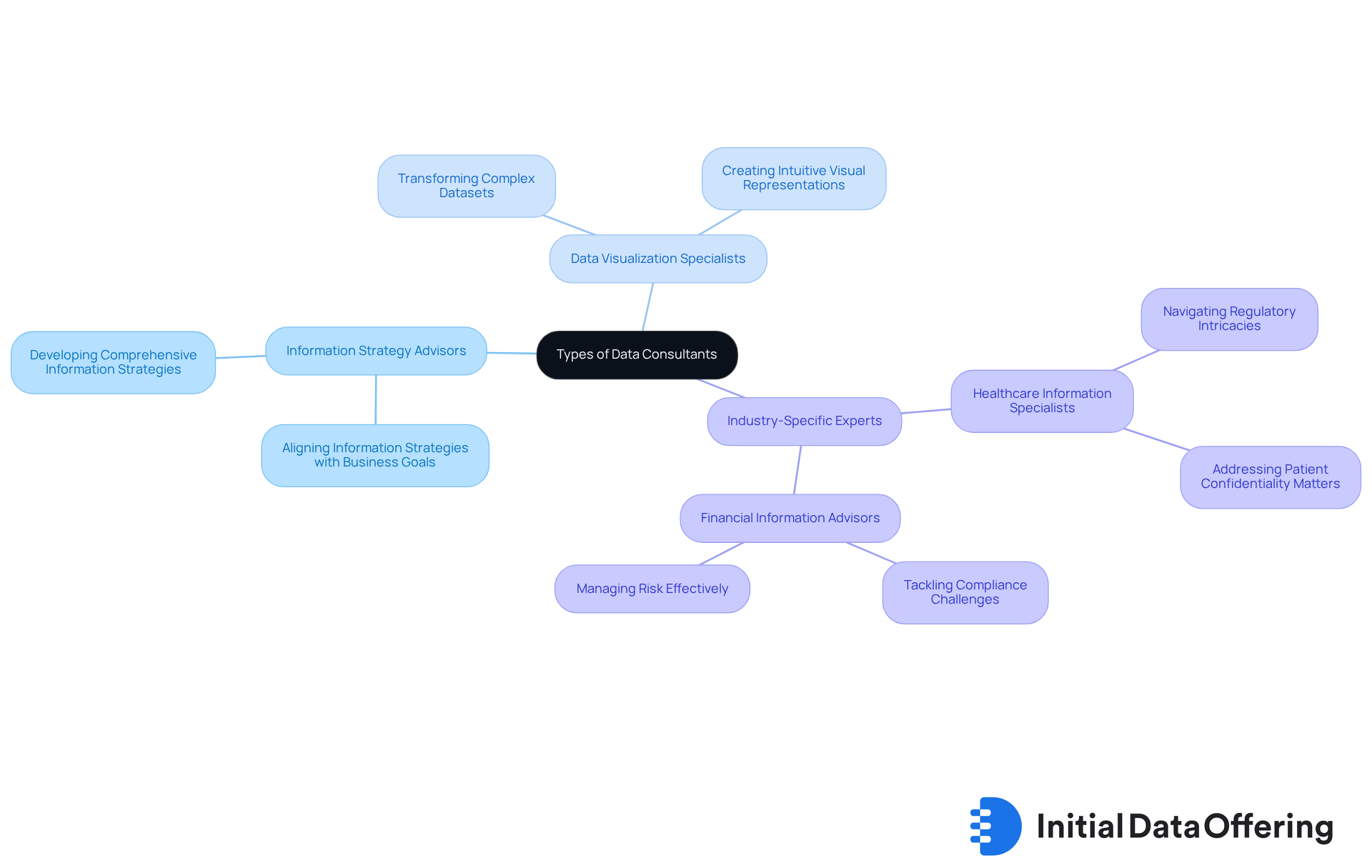What is a Data Consultant? Roles, Skills, and Impact Explained

What is a Data Consultant? Roles, Skills, and Impact Explained
Overview
Data consultants are professionals who analyze and interpret complex datasets to facilitate informed, evidence-based decisions within organizations. Their expertise significantly enhances business performance and information management practices. By employing the FAB (Features, Advantages, Benefits) framework, we can appreciate the features of data consultants: they possess essential skills in data analysis and governance. The advantage of these skills lies in their ability to drive innovation, optimize operations, and ensure compliance with regulations. Ultimately, the benefit to organizations is a more strategic approach to decision-making, leading to improved business outcomes.
The article outlines the key roles of data consultants, emphasizing their impact on business success. Their proficiency in data analysis allows them to uncover insights that can transform operations. For instance, consider how a data consultant might identify inefficiencies in a supply chain, leading to cost reductions and enhanced productivity. This example illustrates the tangible benefits that data consultants bring to the table.
In conclusion, the role of data consultants is crucial in today’s data-driven landscape. Their contributions not only optimize business processes but also foster a culture of innovation and compliance. Organizations that leverage the expertise of data consultants are better positioned to navigate complexities and achieve sustainable success.
Introduction
Understanding the intricacies of data management is paramount for organizations striving to remain competitive in an increasingly data-driven world. Data consultants emerge as essential allies in this landscape, equipped with the skills to analyze and interpret complex datasets. Their expertise not only guides businesses toward informed decision-making but also enhances overall performance.
What exactly does a data consultant do? They play a crucial role in transforming an organization’s approach to analytics. As companies grapple with the challenges of navigating vast amounts of information, data consultants become not just beneficial but crucial for unlocking new opportunities. Their insights drive strategic growth and enable organizations to harness the full potential of their data.
In this context, the value of data consultants cannot be overstated. By leveraging their skills, organizations can better understand their data landscape, ultimately leading to improved operational efficiency and competitive advantage.
Define Data Consultant: Roles and Responsibilities
An information specialist, often referred to as a data consultant, is a professional dedicated to analyzing, interpreting, and utilizing complex datasets, thereby assisting organizations in making informed, evidence-based decisions. What does this mean for organizations? The primary responsibilities of these specialists include:
- Evaluating information management practices
- Developing governance strategies
- Providing insights that enhance business performance
By collaborating with stakeholders, they identify key performance indicators (KPIs) and ensure that analytical practices align with organizational objectives.
Moreover, information specialists may:
- Design and implement information management systems
- Conduct training sessions
- Create visualizations to effectively communicate findings
How can these actions impact your organization? By leveraging the expertise of a data consultant, organizations can enhance their decision-making processes and drive performance improvements. In essence, the work of data consultants not only streamlines data management but also empowers organizations to harness the full potential of their datasets.

Identify Essential Skills for Data Consultants
Data specialists must possess a diverse set of skills that integrate technical expertise with strong interpersonal abilities. Essential technical competencies include:
- Data analysis
- Proficiency in programming languages such as SQL and Python
- Mastery of visualization tools like Tableau and Power BI
- A solid understanding of statistical techniques and data modeling
These skills enable them to derive meaningful insights from complex datasets.
On the interpersonal side, effective communication skills are vital. Data consultants must translate complex data findings into actionable strategies that resonate with clients, ensuring that insights facilitate informed decision-making. Problem-solving skills, adaptability, and a collaborative mindset further enhance a consultant's effectiveness, enabling them to navigate diverse team dynamics and meet stakeholder expectations.
The demand for these skills is evident in the job market, where the number of positions for data specialists is projected to grow by 36 percent from 2023 to 2033, significantly outpacing the average job growth of 4 percent across all occupations in the nation. This growth underscores the importance of continuous education and skill enhancement in areas such as machine learning, cloud computing, and narrative analytics. Successful data consultants exemplify this combination of expertise, as demonstrated in case studies where their ability to communicate effectively and solve complex problems has led to substantial business outcomes. For instance, a specialist who integrated ethical considerations into their data projects not only built trust with clients but also fostered long-term relationships that enhanced project success. Furthermore, the importance of communication skills for a data consultant in analytics consulting cannot be overstated, as they are essential for bridging the gap between intricate analytical results and practical insights for stakeholders.
In summary, the evolving landscape of data consulting necessitates a strong blend of technical and interpersonal skills, positioning data consultants as vital partners in implementing analytics-driven strategies across various sectors.

Examine the Impact of Data Consultants on Business Success
Data consultants play a crucial role in enhancing business success by enabling organizations to leverage the potential of information. A data consultant assists businesses in identifying trends, optimizing operations, and making informed decisions that lead to improved performance. For instance, when an analytics expert examines client information, they can reveal insights that enhance marketing strategies. This ultimately boosts customer engagement and sales, illustrating the significant advantages they provide.
Moreover, the expertise of information advisors in information governance ensures that organizations maintain compliance with regulations, thereby minimizing the risk of legal issues. This feature not only safeguards the organization but also fosters trust with stakeholders. By upholding compliance, businesses can focus on innovation and growth, knowing they are operating within the legal framework.
Overall, data consultants empower companies to utilize insights as strategic resources. This capability promotes innovation and provides a competitive edge in the marketplace. How might your organization benefit from the insights provided by an information advisor? By considering their contributions, businesses can unlock new opportunities for success.

Explore Types of Data Consultants and Their Specializations
Information specialists can be categorized into multiple groups according to their expertise, each providing distinct abilities and perspectives that are essential for companies striving to improve their analytical practices. For example, information strategy advisors concentrate on developing extensive information strategies that correspond with overall business goals. This alignment guarantees that information initiatives create value and aid decision-making processes. In contrast, data visualization specialists excel in transforming complex datasets into intuitive visual representations, facilitating easier understanding and actionable insights for stakeholders.
Furthermore, industry-specific experts, such as healthcare information specialists or financial information advisors, possess specialized knowledge that enables them to address unique challenges within their fields. For instance, healthcare information advisors frequently navigate regulatory intricacies and patient confidentiality matters, while financial information specialists tackle compliance and risk management challenges. The demand for such specialized advisors is increasing, with market trends indicating a rising need for expertise in fields like information governance, analytics, and machine learning.
Recent case studies emphasize the significant influence of these advisors. For instance, GE Aviation created a centralized information governance program that enhanced operational efficiency for over 1,800 users worldwide. This showcases the value of specialized governance expertise, closely connecting to the function of governance specialists and highlighting their significance in addressing organizational issues. Likewise, Unilever's establishment of an information governance framework simplified vendor onboarding procedures, reducing time from days to hours and improving operational efficiency.
As organizations increasingly acknowledge the importance of information-driven decision-making, the role of consultants becomes ever more essential. Their ability to provide tailored solutions and insights not only optimizes data practices but also establishes them as a data consultant, driving innovation and strategic planning across various industries. How can your organization leverage the expertise of information specialists to enhance its analytical capabilities?

Conclusion
Data consultants play a pivotal role in transforming complex datasets into actionable insights, enabling organizations to make informed decisions and optimize their operations. Their multifaceted roles include:
- Evaluating information management practices
- Developing governance strategies
- Providing critical insights that drive business performance
By collaborating with stakeholders and aligning analytical practices with organizational objectives, data consultants empower businesses to harness the full potential of their data.
Essential skills required for data consultants include:
- Technical expertise in data analysis and programming
- Strong interpersonal abilities for effective communication
The growing demand for these professionals underscores their importance in today’s data-driven landscape. The impact of data consultants on business success is evident through their ability to identify trends, maintain compliance, and foster innovation, ultimately providing a competitive edge in the marketplace.
Recognizing the significant contributions of data consultants is crucial for any organization aiming to enhance its analytical capabilities. By leveraging their expertise, businesses can unlock new opportunities for growth and success. Engaging with data consultants not only streamlines data management but also establishes a foundation for informed decision-making that can lead to lasting improvements in performance and strategic outcomes.
Frequently Asked Questions
What is a data consultant?
A data consultant, also known as an information specialist, is a professional who analyzes, interprets, and utilizes complex datasets to help organizations make informed, evidence-based decisions.
What are the primary responsibilities of a data consultant?
The primary responsibilities of a data consultant include evaluating information management practices, developing governance strategies, and providing insights that enhance business performance.
How do data consultants collaborate with organizations?
Data consultants collaborate with stakeholders to identify key performance indicators (KPIs) and ensure that analytical practices align with organizational objectives.
What additional tasks may data consultants perform?
In addition to their primary responsibilities, data consultants may design and implement information management systems, conduct training sessions, and create visualizations to effectively communicate findings.
How can the work of a data consultant benefit an organization?
By leveraging the expertise of a data consultant, organizations can enhance their decision-making processes, drive performance improvements, streamline data management, and harness the full potential of their datasets.